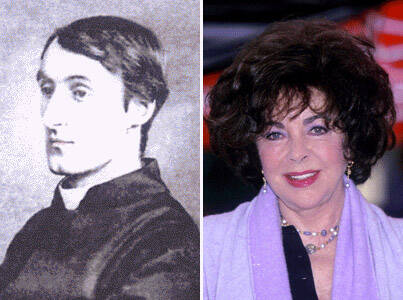At Elizabeth Taylor’s funeral in March, the actor Colin Farrell read “The Leaden Echo and the Golden Echo,” by the English Jesuit priest and poet Gerard Manley Hopkins (1844-1889). The poem was reported to be among the late actress’s favorites.
"My dear Miss Taylor," he began.
"Oh, Fr. Hopkins, please call me Liz."
"Why yes, ah, ah, Liz, ah, I've been thinking about you recently, since I heard of your death, and...."
"Oh, Fr. Hopkins, how kind you are."
"Well, ah, Liz, I also heard that you had my poem 'The Leaden Echo and the Golden Echo' read at your funeral. I'm very honored, for that poem seems so well to fit your beauty and your new life with God that I'd like to discuss it with you."
"Oh, please tell me more about it, Fr. Hopkins."
"I began the poem in 1880 while visiting my family in London, finished it two years later at the Jesuit school where I taught in Lancashire, and planned it as a musical 'Maidens’ song' for 'St. Winefred’s Well,' a play I never completed. It deals quite directly with the beauty of young women."
"You flatter me, Fr. Hopkins."
"Yes, Liz, but my poem worries about beauty. The first part, 'The Leaden Echo,' frets about losing beauty: 'How to keep.../ Back beauty, keep it, beauty, beauty, beauty,...from vanishing away.'" It even considers eight ways to 'keep' beauty: a 'bow or brooch or braid or brace, lace, latch or catch or key'—the list is very feminine, even a bit comic. But they're all useless, and beauty becomes 'frowning,' 'wrinkles,' 'grey,' 'drooping,' 'dying,' 'tombs and worms.' In short, ‘Nothing can be done/ To keep at bay/ Age and age's evils.' 'The Leaden Echo' ends with a thud: 'Be beginning to despair, to despair,/ Despair, despair, despair, despair.'"
"Ah, Fr. Hopkins, you are so terribly right. When I was young, everyone praised my 'violet eyes,' my eyelashes, my 'spectacular radiance,' called me 'a sexual goddess.' I played Hollywood’s best roles: 'National Velvet,' 'Father of the Bride,' 'A Place in the Sun,' Tennessee Williams' 'Cat on a Hot Tin Roof' and 'Suddenly Last Summer,' 'Butterfield 8,' Edward Albee's 'Who's Afraid of Virginia Woolf?' and my famous 'Cleopatra.' At my death, Time magazine wrote, 'Taylor was routinely called the world’s most beautiful woman.'"
"But ah, the sadness of my life, too: eight marriages, aging in youthful Hollywood, weight-gain, lost beauty, a wheelchair finally, and death at 79. You were right, Fr. Hopkins: life is only a dull 'Leaden Echo.'"
“But ah, my dear Liz, you must not forget the second half, 'The Golden Echo.' This new echo—not 'Despair' but 'Spare!'—goes beyond death to the beauty 'Yonder.'" I recognize the earthly loss, but do not let fleeting beauty preoccupy you; rather, there 'is an everlastingness..., Oh, it is an all youth!/ Come then, your ways and airs and looks, locks, maidengear, gallantry and gaiety and grace,/ Winning ways, airs innocent, maiden manners, sweet looks, loose locks, long locks, lovelocks, gaygear, going gallant, girl grace—/ Resign them, sign them, seal them, send them."
"But 'send them' where, Father?"
"Ah, Liz, here is my lovely answer to the riddle of beauty: 'Give beauty back, beauty, beauty, beauty, back to God beauty's self and beauty's giver.’ First, in life, we dedicate our earthly beauty to God, then, at death, we go 'Yonder.' All in all, 'not a hair...is lost,' for God keeps beauty 'with fonder a care.../ Yonder.... We follow, now we follow.—Yonder, yes yonder, yonder,/ Yonder.' Ah, Liz, yes, ‘Yonder, yes yonder,’ all the way here to heaven."
"Dear Fr. Hopkins, now I better understand this higher, less perishable beauty. I am so grateful."
"And, lovely Liz, now we are both here, both 'Yonder'—you, the beauty, I, the poet of beauty, with the God of lasting beauty. Blessed be beauty, blessed be the God of beauty.”
"Oh, thank you, Fr. Hopkins. I'm so happy I chose that poem. And I am now at peace 'Yonder,' in my beautiful 'Golden' City of God."









As my favorite poet is Gerard Manley Hopkins, I love this essay. Many thanks to the writer/Hopkins scholar for making the Leaden Echo/The Golden Echo ever more meaningful to me. And also for putting the most beautiful woman of my generation in the heavenly light she deserves. How can we not have compassion for one whose beauty tumbled, perhaps, more than any one. And from what I read, she, herself, was a most compassionate woman.